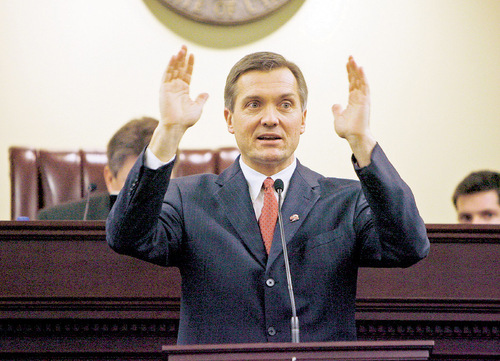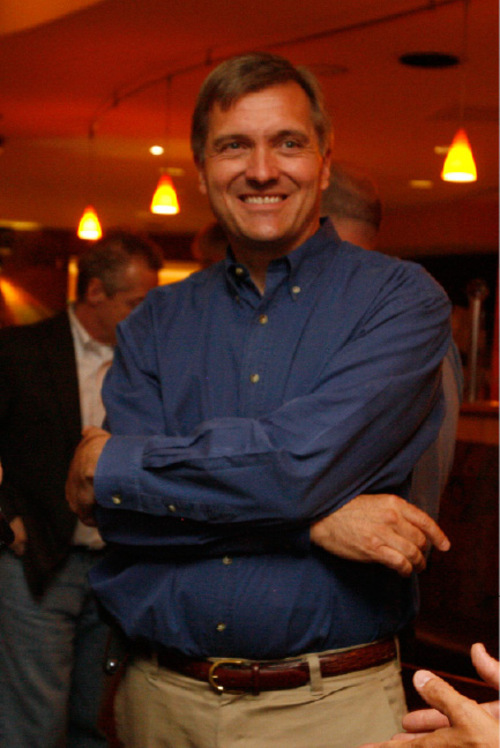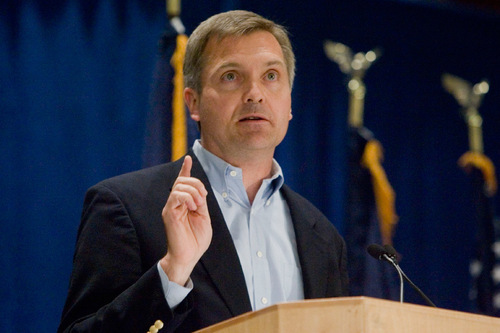This is an archived article that was published on sltrib.com in 2010, and information in the article may be outdated. It is provided only for personal research purposes and may not be reprinted.
Washington • Special interest groups have become a bigger factor in Rep. Jim Matheson's fundraising every time he has run for re-election, hitting a high this year that only two House incumbents can top.
So far, more than 84 percent of Matheson's contributions have come from the political action committees of businesses, labor unions and other politicians. That ranks third out of 435 House members, according to an analysis by the Center for Responsive Politics.
His critics say this is evidence that Matheson is a Washington insider focused on the needs of well-funded interests, but the Democratic congressman said it's nothing of the sort.
He said he didn't feel right asking people to fund his sixth campaign during a rough economic time.
"I pretty much left individuals alone in this cycle, based on the economic situation," Matheson said. "I consciously made a decision to respect people's circumstances."
The average House member raises about 43 percent of his or her funds from political action committees, known as PACs. And that percentage has remained steady for years. Utah's other House members are also higher than the average, though nowhere near Matheson. Rep. Rob Bishop's reliance on PACs stands at 57 percent, while Rep. Jason Chaffetz's is 52 percent. Those figures account for contributions from the start of 2009 to the end of June 2010, the most recent data available.
Since their creation after the Watergate corruption scandal, PACs have become a staple of federal campaigns, particularly benefiting incumbents and often switching support from one party to the next depending on who has control of Congress.
First-time candidates often have a hard time attracting PAC support, but that wasn't the case for Matheson, who, in 2000, won in a swing district with heavy backing from labor unions. In his first race, 35 percent of his money came from PACs, and that percentage has grown each year, rising to 77 percent in the 2008 campaign, though the sources have changed. His union money has declined, while he has seen a big increase in contributions from health care-, energy- and finance-related PACs.
Still, a Salt Lake Tribune analysis of Matheson's fundraising history indicates that House Majority Leader Steny Hoyer and the Blue Dog Caucus are his biggest all-time backers, followed by six labor unions, Union Pacific and the National Association of Realtors. Each of those PACs has given him at least $50,000 since 1999.
Falling just under that threshold are other prominent Democrats such as House Speaker Nancy Pelosi of California, who has given Matheson $46,000 from her PAC and campaign account, and Rep. Charlie Rangel of New York, who has contributed $45,000.
This election, the Blue Dogs and PricewaterhouseCoopers, a massive auditing firm, are his top PAC supporters, contributing $15,000 each, the legal maximum.
Matheson's Republican challenger, Morgan Philpot, said the congressman's reliance on PAC money is a clear indication that he has "gone Washington."
"I don't know how you can possibly take 84 percent of your money from special interests, then turn around and say you put Utah first. It just doesn't make sense," said Philpot, a former state lawmaker. "I think he has completely lost touch."
Philpot has raised a little more than $112,000, less than one-tenth of Matheson's total. More than 80 percent of Philpot's money is from individuals — almost all from Utah. He has taken two PAC contributions — one from EnergySolutions and another from Mitt Romney's Free and Strong America.
Matheson rejects Philpot's claim that somehow the contributions cloud his focus.
"This comes from such a range of interests that chose to support me. By definition, nobody owns me," Matheson said.
Philpot isn't sure that's necessarily a good thing.
"I don't think it's healthy to take money from just anyone," he said. "I think you need to show a little discretion when you take from PACs."
Matheson said just because a PAC has a Washington, D.C., address doesn't mean it isn't supported and funded by people back home. PACs get their money from company executives or supporters, and that money comes from across the nation. Matheson said he often works with people in Utah, real estate agents or energy company executives, for example, who encourage their PACs to contribute to him.
"There is a significant Utah dynamic," he said.
Matheson said the current figure, 84 percent, will likely dip a little before the year is out.
"Most individual money comes at the end," he said. "I will be very aggressive in raising individual money as we go down the stretch."
Generally, candidates with a high percentage of PAC money raise questions about their support back home and whether they will focus their attention on serving their district or their "corporate constituency," said Dave Levinthal of the Center for Responsive Politics, which conducted the research. "Oftentimes, it reflects the way a candidate is waging his or her campaign. It can be indicative of what their priorities are."
In Matheson's case, the PAC money is far more indicative of his status in Congress and the political realities he faces than anything else, said David Magleby, a political scientist at Brigham Young University, who specializes in campaign finance.
While Matheson's PAC focus is far beyond the norm, Magleby said it's consistent with the general patterns seen in American politics, since he is a potential swing vote on committees that oversee energy, health care and economic policies.
Magleby also said Utah isn't known as a state that gives heavily to Democrats and that Matheson, who represents a Republican-leaning district, must raise big amounts in an attempt to ward off rich challengers.
"He runs as an endangered species in any election," he said. "To survive in a $1.5 million to $2 million House race, he's going to have to raise money from PACs and out-of-state people. It's a simple fact of life."
Matheson also said the competitive nature of his district impacts how he raises funds, though the Cook Political Report has identified a few dozen competitive races this year, and none of those other incumbents are in the top 10 in percentage raised from PACs.
Magleby said he would have concerns if a candidate received a massive amount of money from PACs representing a certain sector or interest, say labor unions or telecommunication companies. But Matheson gets large amounts of money from dozens of PACs, and 89 of them have contributed to him in at least five separate elections.
"I'm less concerned when I see a range of PACs supporting him," the political scientist said.
He also doubts the money has resulted in a changed vote, but he said the research shows that "PAC money clearly helps those interest groups have access to congressmen." That's something Matheson flatly denies.
"I've said all along, if people chose to donate to my campaign, it is their decision," Matheson said. "It doesn't get them anything."







